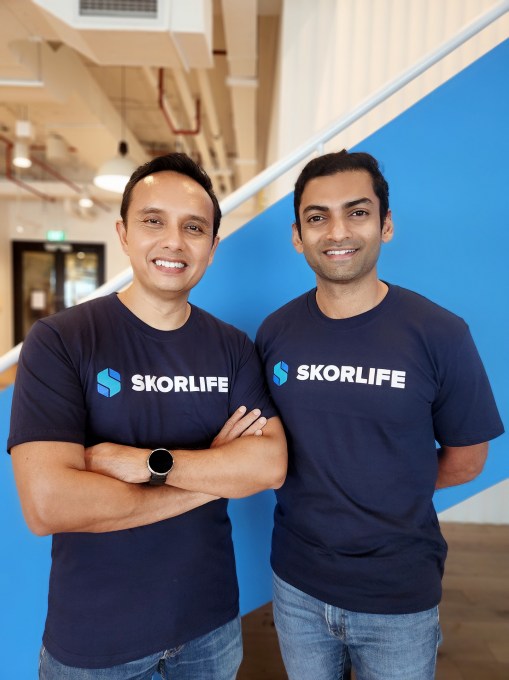Indonesia’s credit bureaus currently have about 92 million credit records, but the founders of SkorLife say many people have trouble accessing their own data. That’s why they built the app, which not only lets people see their credit histories for free, but also gives personalized advice on how to improve data. The Jakarta-based startup announced today it has raised $2.2 million in pre-seed funding.
AC Ventures participated in the round, which also included Saison Capital and angel investors like all the founders of OneCard; Advance.ai’s Jefferson Chan; KoinWorks’ Will Arifin of KoinWorks; Lummo’s Krishnan Menon; Evermos’ Arip Tirta of Evermos; Qoala’s Harshet Lunani; Init-6’s Willy Arifin; Lummo’s Krishnan Menon; Evermos’ Arip Tirta; Qoala’s Harshet Lunani; Init-6’s Achmad Zaky; and executives from Northstar Group, Stripe, Google, Boston Consulting Group, Gojek and CreditKarma.
SkorLife says the private, alpha version of its app has been downloaded more than 3,000 times and is growing organically by 50 to 60 new users a day. That surpasses its internal target by 7x and the app will be available for public download soon. The company’s new funding will be used on product development, new hires and marketing. SkorLife currently has 10 employees, with plans to increase headcount to 40.
CEO Ongki Kurniawan was previously country head of Stripe Indonesia and also held leadership positions at Grab, telcoXL Axiata and Line, while COO Karan Khetan is a serial entrepreneur whose past startups include 5x and BookMyShow Southeast Asia. The two met in 2018 while setting up a partnership between Grab and BookMyShow to offer ticketing services through Grab’s super app.

SkorLife founders Ongki Kurniawan and Karan Khetan
Kurniawan tells TechCrunch the two spent a lot of time exploring different ideas. The first was to digitize the “pawn broker”/secured loan industry, but the unit economics did not work.
“However, we found that many Indonesians resort to pawning their items because they believe they will get rejected if they approach banks,” he said, adding that seven out of 10 loan applicants do indeed get rejected. “This was further validated after speaking with a number of industry experts. We learned that Indonesia’s consumer borrowing pool is small.”
While doing their research, Kurniawan and Khetan also saw that many Indonesians don’t have access to their credit scores and other data that would help them see how banks determine their creditworthiness, which in turn means they lose the opportunity to access affordable loans.
SkorLife’s founders say that creditworthiness is underused in Indonesia, where most financial institutions score a person’s ability to get lines of credit based on their “income worthiness.”
“The thing to remember is not everyone who has high income will pay their debt and not everyone who has a low income will not pay their debt,” Kurniawan said.
Kurniawan said that most people in Indonesia are unaware they can access their own credit history and credit scores, and believe that only financial institutions and banks have access to that information.
If they do figure out how to access it, they have two options. The first is the free route, where they request data from OJK (Indonesian Financial Services Authority). But the problem with this is that they either have to go to an OJK office, or wait days for an online appointment. The second, paid route involves customers going to three licensed credit bureaus in Indonesia to get their credit reports. But these reports cost money, and Kurniawan says they are many pages long “and not designed to be digested by consumers because it is intended to be used by analysts in financial institutions.”
SkorLife solves those problems by giving people free access to credit scores they would otherwise have to jump through hurdles to get. Its main product is a credit builder application that enables people to instantly see and monitor their credit scores, credit reports and other data from credit bureaus, for free. It also helps users dispute inaccurate information on their credit reports. If someone doesn’t have a credit history yet, the app will help them start building scores.
Through the app, customers can see their BI Checking Score, or Indonesia’s nationally-recognized credit information that is used by almost all financial institutions to make credit decisions, as well as their credit score, which is generated by credit bureaus to determine the possibility of someone defaulting on a loan in the next 12 months.
They also see what factors go into their credit score, including their payment history, credit utilization, the balance versus their secured versus unsecured credit accounts, the age of each of their credit accounts, ID monitoring to see if a financial institution is doing a hard check on their data, the total number of credit accounts they have, both active and inactive, and outstanding balances.
That data is then used to create AI-based, personalized insights for each customer that they can use to improve their credit scores. The app also has educational content and a features that makes it easy for customers to dispute inaccurate data.
Some examples of insights include payment history, and allowing customers to check bill dates and set reminders, age of credit (or encouraging customers not to close a card that has been open for a long time), and utilization. SkorLife recommends that customers maintain a credit card limit utilization beneath 30% to improve their score.
In a statement, AC Ventures founder and managing partner Adrian Li said, “The opportunity in Indonesia is massive. Even as the space is relatively untapped, the consumer credit market size is already north of US$185 billion. That said, it has always been a challenge here because lenders have never been able to draw holistic conclusions about borrowers based on limited and fragmented information. But with these data troves just waiting to be unlocked and used meaningfully in a consumer-facing app, we are excited about SkorLife’s vision and mission of putting people back in charge of their financial futures.
DUOS





